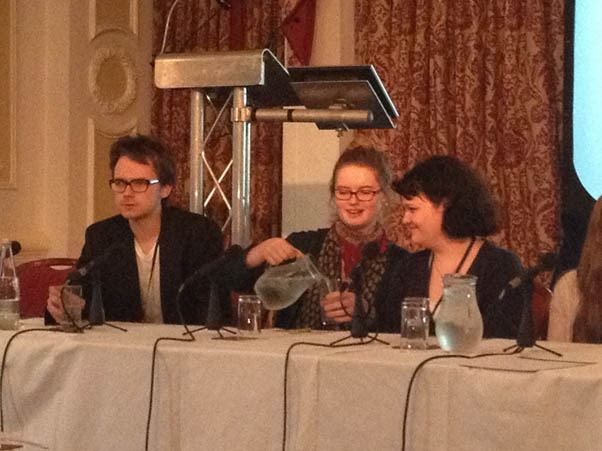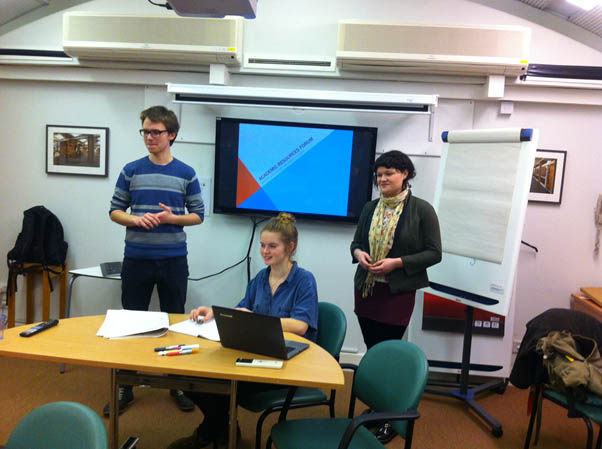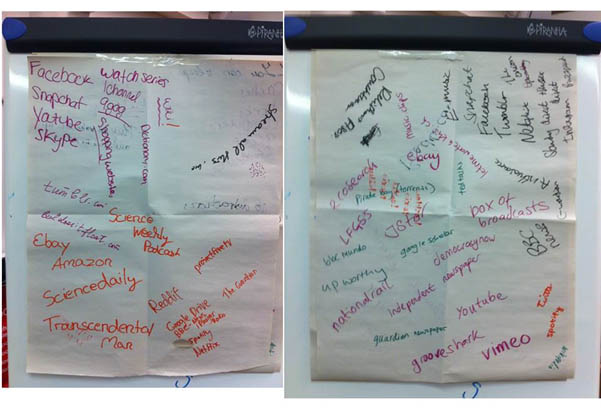At the University of Sussex, we’ve embarked on a collaborative venture with SAGE publishers, taking the ‘Child of our time’ approach to learn more about the student journey. We hope that by capturing evidence of the development of an undergraduate during their three years at university, we will be able to track changes in their behaviour and in their evolving interaction with the Library. We hope to gain a deeper understanding of how students develop their research skills, how they discover resources, how they use them, and also to gain some insight into how they want those resources to be delivered.
The three undergraduate students, from Geography, Psychology and International Relations, have signed up for three years with us. What do they get out of it? A scholarship (funded by SAGE) but also the opportunity to develop their communication and presentation skills, to use social media skills in a professional environment and the chance to work with an international academic publisher. All things that will look very good on their CVs when they finish at Sussex.
What were we asking of them?
- A time commitment equivalent to up to 2 hours a week during term time
- A commitment to writing regular blog posts and taking part in Library activities and events
- Active engagement with SAGE
Students as researchers
The ERIAL Project takes an ethnographic approach to research, attempting to elicit responses from students about their experiences. This is something we’re hoping to achieve with our venture, by asking the students to blog about their experiences. We wanted the blog to be a key aspect of the project. We worked with SAGE to put together a list of potential blog topics, identifying areas where we wanted to learn more about student behaviour. The first few topics included:
- How students prepare themselves for university and the choices they make around pre-arrival reading
- How students select the sources they use and how they navigate through their reading lists
- When do students embark on research beyond reading list recommendations?
- A day in the life of a ‘digital native’ – what apps and devices do they use?
- How do students want to access resources? How do they feel about ebooks?
In their discussion of ethnographic research methods, Cohen, Manion and Morrison make the point that “social research needs to examine situations through the eyes of the participants” and that “enquiries are influenced by enquirer values as expressed in the choice of a problem … and in the framing, bounding and focusing of that problem” (2013, p.220). We wanted the students’ blog to be the main vehicle through which we would learn about their journeys through university. We were particularly aware of the fact that our “enquirer values” would be influential but pragmatically, we realized that the students would need some help and direction to get started with blogging, as an academic year passes very quickly. For this reason, we thought that it would be a good idea to give them some research to do. They would then have data that they could analyse and discuss in their blog. Their first piece of research was a survey, which they wrote themselves, to look at various aspects of pre-arrival reading by undergraduates. You can read the results of the survey in their Survey analysis blog post.
Student focus groups
The next piece of research the students embarked on was focus groups to explore issues around the sources students use, the evaluation they do, and the devices they use. As with the survey, we wanted this to be a student-led piece of research, so the students organised and ran the focus groups themselves, without any librarians in attendance. Handing over the reins to the students to carry out the research themselves felt risky. It can be difficult to get students to turn up for focus groups or participate in your surveys, so it was hard to step back and let them get on with, worrying that it might be a missed opportunity for us to gather some great qualitative data. On the whole, I think our fears proved unfounded as the focus groups yielded interesting results. Having students researching their own peers gave a student perspective to the questions and brought issues and priorities to the surface in a way that might not have happened had they been librarian-led focus groups.
What have we learnt so far about students’ information and learning behaviours?
Our focus of course was on first year students and we are aware that behaviours and motivations are likely to change over the course of the three years. In fact, that is something we are actively trying to ‘measure’ is some way with this project. What we have so far is an interesting picture of student behaviour in the run up to starting at university, their response to induction, and the way they have gone about their first pieces of research at university.
We asked the students to recall a recent research assignment and to blog about their experience of the research process, including the decisions they made about where and how to search for sources, and how to decide which to use. One of the students documented this process using a series of screenshots in her Completing an assignment blog post. We also asked the students to consider using a photo diary approach to record how they prepared for their exams. We even suggested that they might want to set up a camera in their room to film themselves at work. They stopped short of filming themselves (possibly due to anxieties about the untidiness of their student accommodation) but they did tentatively embrace the photo dairy approach as shown in one of the Exam Preparation blog posts.
The results from the focus groups suggest that students are used to accessing information from a wide range of sources/apps/platforms/websites but when it comes to research for their academic work, Google is ubiquitous, as is Wikipedia.
The students discussed the fact that many of their tutors are quite strict when it comes to sources, so they use Wikipedia as a starting point, not a final destination. On the whole, they do not venture far from their lecture notes and reading lists for their first year assignments, since tutor recommendation is so important.
Print or online?
When it comes to books, the students expressed a strong preference for print. However, they admitted that they liked the immediacy of ebooks (particularly useful in seminars when you turn up without having done the reading – one student described lurking in the back row and quickly downloading the relevant chapter onto his iPad). An important question here for libraries is whether we are focusing our energies in the right place. Our usage stats this year certainly show a dramatic rise in use of ebooks, but are we trying to push our students towards online when they want print?
This print v online theme recurred when our three students were questioned by the audience at UKSG in Harrogate earlier this year. I presented our project and our findings so far, alongside the three students, during a breakout session at the conference. Our full presentation is available online but the students also blogged about their first conference experience. There were many publishers in the audience who were keen to ask the students questions. They were particularly interested in understanding why the students preferred print, and when they would opt for print over online.
The year ahead
As the students move into their second year, we will ask them to carry out further research and we will be very interested to see if there are any changes in their information and learning behaviours. They will survey their fellow second years to find out how approaches to research have developed and they will run further focus groups to revisit the theme of the use of resources. We are also hoping to have a photo diary of “A week in the Library” as well as another revision event. The students will continue to blog about their experiences and we hope that from that, we will understand more fully the journey made by students during their time at university.
Cohen, L., Manion, L. and Morrison, K. (2013) Research methods in education. 7th edn. Hoboken: Taylor and Francis.
 Suzanne Tatham
Suzanne Tatham
Learning & Teaching Support Librarian
University of Sussex
@suzannetatham


